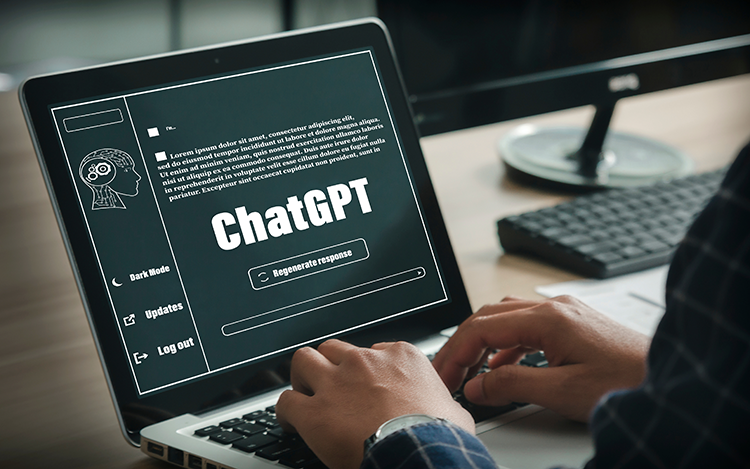Use of ChatGPT to support fee bid is 'utterly and unusually unpersuasive,' federal judge says

A federal judge in New York City has reduced a law firm’s fee request by about half after criticizing its use of the artificial intelligence tool ChatGPT-4 as a “cross-check” to determine prevailing market rates for attorneys. (Image from Shutterstock)
A federal judge in New York City has reduced a law firm’s fee request by about half after criticizing its use of the artificial intelligence tool ChatGPT-4 as a “cross-check” to determine prevailing market rates for attorneys.
U.S. District Judge Paul A. Engelmayer of the Southern District of New York said in a Feb. 22 opinion the Cuddy Law Firm’s use of ChatGPT-4 to reinforce its fee bid is “utterly and unusually unpersuasive,” report Reuters and Law360.
The Cuddy Law Firm had sought $113,484 in fees plus interest. Engelmayer granted fees of $53,050 plus interest.
The proper reference, Engelmayer said, would be the rate paid to comparable lawyers in special education law in the Southern District of New York. The Cuddy Law Firm had represented a child seeking a free appropriate education based on his disabilities, which included disorders relating to language, hyperactivity, attention deficit and stress.
The firm had sought hourly fees of $550 to $600 for senior lawyers, $425 for midlevel associates and $375 for junior associates.
“These hourly rates exceed those awarded in this district, for attorneys of comparable experience, and indeed for some of these very attorneys,” Engelmayer said.
Engelmayer said the firm had cited ChatGPT-4 sources as a “cross-check” to support “problematic sources” regarding hourly billing rates that aren’t specific to lawyers in special education litigation.
“As the firm should have appreciated, treating ChatGPT’s conclusions as a useful gauge of the reasonable billing rate for the work of a lawyer with a particular background carrying out a bespoke assignment for a client in a niche practice area was misbegotten at the jump,” Engelmayer wrote.
Engelmayer cited recent cases in which ChatGPT generated fake case citations.
“In claiming here that ChatGPT supports the fee award it urges, the Cuddy Law Firm does not identify the inputs on which ChatGPT relied. It does not reveal whether any of these were similarly imaginary. It does not reveal whether ChatGPT anywhere considered a very real and relevant data point: the uniform bloc of precedent … in which courts in this district and circuit have rejected as excessive the billing rates the Cuddy Law Firm urges for its timekeepers.
“The court therefore rejects out of hand ChatGPT’s conclusions as to the appropriate billing rates here. Barring a paradigm shift in the reliability of this tool, the Cuddy Law Firm is well advised to excise references to ChatGPT from future fee applications.”
Benjamin Kopp of the Cuddy Law Firm told Reuters that he queried ChatGPT-4 about the rates that clients might expect to be charged by attorneys and questions that clients might ask to determine how rates and fees would be affected by various factors in a case.
He addressed that issue in an August 2023 declaration.
“The underlying assertion was not about ChatGPT’s correctness on rates, but rather, what parents would expect as consumers,” Kopp told Reuters in an email.
U.S. District Judge Paul A. Engelmayer of the Southern District of New York said in a Feb. 22 opinion the Cuddy Law Firm’s use of ChatGPT-4 to reinforce its fee bid is “utterly and unusually unpersuasive,” report Reuters and Law360.
The Cuddy Law Firm had sought $113,484 in fees plus interest. Engelmayer granted feels of $53,050 plus interest.
The proper reference, Engelmayer said, would be the rate paid to comparable lawyers in special education law in the Southern District of New York. The Cuddy Law Firm had represented a child seeking a free appropriate education based on his disabilities, which included disorders relating to language, hyperactivity, attention deficit and stress.
The firm had sought hourly fees of $550 to $600 for senior lawyers, $425 for midlevel associates and $375 for junior associates.
“These hourly rates exceed those awarded in this district, for attorneys of comparable experience, and indeed for some of these very attorneys,” Engelmayer said.
Engelmayer said the firm had cited ChatGPT-4 sources as a “cross-check” to support “problematic sources” regarding hourly billing rates that aren’t specific to lawyers in special education litigation.
“As the firm should have appreciated, treating ChatGPT’s conclusions as a useful gauge of the reasonable billing rate for the work of a lawyer with a particular background carrying out a bespoke assignment for a client in a niche practice area was misbegotten at the jump,” Engelmayer wrote.
Engelmayer cited recent cases in which ChatGPT generated fake case citations.
“In claiming here that ChatGPT supports the fee award it urges, the Cuddy Law Firm does not identify the inputs on which ChatGPT relied. It does not reveal whether any of these were similarly imaginary. It does not reveal whether ChatGPT anywhere considered a very real and relevant data point: the uniform bloc of precedent … in which courts in this district and circuit have rejected as excessive the billing rates the Cuddy Law Firm urges for its timekeepers.
“The court therefore rejects out of hand ChatGPT’s conclusions as to the appropriate billing rates here. Barring a paradigm shift in the reliability of this tool, the Cuddy Law Firm is well advised to excise references to ChatGPT from future fee applications.”
Benjamin Kopp of the Cuddy Law Firm told Reuters that he queried ChatGPT-4 about the rates that clients might expect to be charged by attorneys and questions that clients might ask to determine how rates and fees would be affected by various factors in a case.
He addressed that issue in an August 2023 declaration.
“The underlying assertion was not about ChatGPT’s correctness on rates, but rather, what parents would expect as consumers,” Kopp told Reuters in an email.
Write a letter to the editor, share a story tip or update, or report an error.



